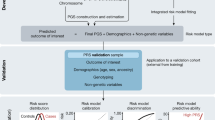Abstract
To review the highest impact studies published from the UK Biobank and assess their contributions to “precision medicine.” We reviewed 140 of 689 studies published between 2008 and May 2019 from the UK Biobank deemed to be high impact by citations, alternative metric data, or publication in a high impact journal. We classified studies according to whether they (1) were largely methods papers, (2) largely replicated prior findings or associations, (3) generated novel findings or associations, (4) developed risk prediction models that did not yield clinically significant improvements in risk estimation over prior models or (5) developed models that produced significant improvements in individualized risk assessment, targeted screening, or targeted treatment. This final category represents “precision medicine.” We classified 15 articles as category 1, 33 as category 2, 85 as category 3, six as category 4, and one as category 5. In this assessment of the first 7 years of the UK Biobank and first 4 years of genetic data availability, the majority of high impact UK Biobank studies either replicated known associations or generated novel associations without clinically relevant improvements in risk prediction, screening, or treatment. This information may be useful for designers of other cohort studies in terms of input to design and follow-up to facilitate precision medicine research.
Similar content being viewed by others
References
Coppola L, Cianflone A, Grimaldi AM, et al. Biobanking in health care: evolution and future directions. J Transl Med. 2019;17:172.
Collins R. What makes the UK biobank special? Lancet. 2012;379(9822):1173–4.
Keane PA, Grossi CM, Foster PJ, et al. Optical coherence tomography in the UK biobank study—rapid automated analysis of retinal thickness for large population-based studies. PLoS ONE. 2016;11(10):e0164095.
Sudlow C, Gallacher J, Allen N, et al. UK biobank: an open access resource for identifying the causes of a wide range of complex diseases of middle and old age. PLoS Med. 2015;12(3):e1001779.
Allen NE, Sudlow C, Peakman T, Collins R. UK biobank data: come and get it. Sci Transl Med. 2014;6(224):224ed4.
Liu A, Pollard K. Biobanking for personalized medicine. In: Karimi-Busheri F, editor. Biobanking in the 21st century. Advances in experimental medicine and biology, vol. 864. Cham: Springer; 2015.
Califf RM. Future of personalized cardiovascular medicine: JACC state-of-the-art review. J Am Coll Cardiol. 2018;72(25):3301–9.
Leopold JA, Loscalzo J. Emerging role of precision medicine in cardiovascular disease. Circ Res. 2018;122(9):1302–15.
Albain KS, Paik S, van’t Veer L. Prediction of adjuvant chemotherapy benefit in endocrine responsive, early breast cancer using multigene assays. Breast. 2009;18:S141–5.
Saracci R. Epidemiology in wonderland: big data and precision medicine. Eur J Epidemiol. 2018;33:245–57.
James JE. Personalized medicine, disease prevention, and the inverse care law: more harm than benefit? Eur J Epidemiol. 2014;29:383–90.
Lee JE, Kim JH, Hong EJ, et al. National Biobank of Korea: quality control programs of collected-human biospecimens. Osong Public Health Res Perspect. 2012;3(3):185–9.
Dummer TJB, Awadalla P, Boileau C, et al. The Canadian partnership for tomorrow project: a pan-Canadian platform for research on chronic disease prevention. CMAJ. 2018;190(23):E710–7.
All of Us Research Program Investigators, Denny JC, Rutter JL, Goldstein DB, 7, et al. The “All of Us” research program. 2019. p. 668–76.
UK Biobank. 21 June 2018. https://www.ukbiobank.ac.uk/2018/06/nightingale-health-and-uk-biobank-announces-major-initiative-to-analyse-half-a-million-blood-samples-to-facilitate-global-medical-research/. Accessed 10 Dec 2019.
Neal Lab. 10 Oct. 2019. Genetic correlation results for heritable phenotypes in the UK Biobank”. http://www.nealelab.is/blog/2019/10/10/genetic-correlation-results-for-heritable-phenotypes-in-the-uk-biobank. Accessed 10 Dec 2019.
Author information
Authors and Affiliations
Corresponding author
Ethics declarations
Conflict of interest
The authors declare that they have no conflict of interest.
Additional information
Publisher's Note
Springer Nature remains neutral with regard to jurisdictional claims in published maps and institutional affiliations.
Electronic supplementary material
Below is the link to the electronic supplementary material.
Rights and permissions
About this article
Cite this article
Glynn, P., Greenland, P. Contributions of the UK biobank high impact papers in the era of precision medicine. Eur J Epidemiol 35, 5–10 (2020). https://doi.org/10.1007/s10654-020-00606-7
Received:
Accepted:
Published:
Issue Date:
DOI: https://doi.org/10.1007/s10654-020-00606-7




